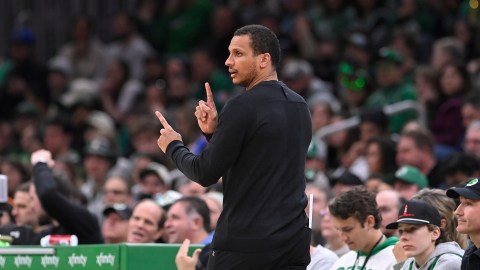The Red Sox will break camp in a month with 25 players heading north to Boston. We begin a daily look at each position on the club, from the projected starters to their backups. Our latest installment examines center field.
The ultimate winner: There is a telling quote about Mike Cameron in a recent Albert Chen article in Sports Illustrated that looked at the Seattle Mariners' new defensive mindset. It was uttered by Tony Blengino, an assistant to M's general manager Jack Zduriencik, but it just as easily could have come from the offices at Fenway Park.
"Mike Cameron played on two of the 10 best defensive teams of all time [the 2001 Mariners and the 1999 Reds]," says Blengino. "Every team he's played for has gotten better. Every team he's left collapsed when he left. No, Mike Cameron's not a Hall of Famer. But he's clearly a winning baseball player."
In this new baseball world of metrics and statistical analysis, the figures Blengino points to are plain, simple and rather easy to digest. Success has followed Cameron at every stop, and it usually leaves town with him.
The year after Cameron left his first team, the Chicago White Sox, they won five fewer games. That same year, 1999, he helped a 77-win Cincinnati club improve to 96-67. Cameron spent just one year as a Red and their win total fell to 85 in 2000.
By that time, Cameron was busy helping Seattle make a two-year climb from a team with a losing record (79-83 in 1999) to one which tied the major league record with 116 victories in 2001. The Mariners won 93 games each of the next two seasons with Cameron in center and then just 63 without him in 2004.
Cameron then helped the lowly Mets climb back to respectability in two seasons at Shea and was part of a turnaround in San Diego. The Padres won 88 and 89 games in Cameron's two seasons there but plummeted to 63 in 2008, when the three-time Gold Glover was an integral part of Milwaukee's first playoff run in 26 years.
To break it down further, teams have won an average of 77.4 games the year before Cameron arrives. They average 76.6 victories the year after he leaves. With the 37-year-old on their roster, these teams have won an average of 89.2 games.
It's an impressive track record that speaks to Cameron's ability to take on a challenge, and it nearly renders moot the whole Cameron-Jacoby Ellsbury debate.
Even if Ellsbury's growth as a center fielder has been thrown off track, the Red Sox have taken on a proven winner eager to play in front of a passionate fan base.
"The expectations are always high," Cameron said this spring when asked about the challenge of playing in Boston. "You're a team with really good players and a team that has won two of the last six World Series. Expectations are always going to be high. And the team that's in this room now is very good, so that's what the expectancy level of it is. That's what I'm looking forward to — to take part in it."
So what makes Cameron such a winner?
His stellar defense is duly noted. He is threatening to become the seventh player in major league history to have 300 home runs and 300 stolen bases. And aside from a grisly collision with Carlos Beltran back in 2005 which caused Cameron to undergo facial surgery, the Red Sox' new center fielder has been rather durable: Cameron has had more than 600 plate appearances in eight of the last 11 seasons.
But it is the clubhouse presence which may make the biggest difference to his teammates.
"He's my best teammate of all time," said Bill Hall, Cameron's teammate in Milwaukee and now again in Boston. "I was only with him for two years, but what he brings to the clubhouse, what he does on a daily basis … he's the same guy every day."
One thing lacking from Cameron's winning resume is the big one. While he has played on four playoff teams, he's never made it to the World Series. Maybe that's why he came to Boston.
Other options: Cameron owns a .245 career mark against right-handers, an issue the Red Sox brass was well aware of when it put this team together. The Sox have an outfield rotation in place which will allow righty-killer Jeremy Hermida to get some starts in left field, with Ellsbury moving over to center and Cameron sitting down.
If all else fails: The Red Sox have Cameron for two years at $7.25 million a year. If by some chance he is unable to finish out that contract and Ellsbury remains planted in left, Boston has some quality outfielders on the farm that could be pushed up through the ranks in a pinch.
Josh Reddick and Ryan Kalish have both seen time in center field, and local product Ryan Westmoreland, considered by many to be the top positional player in the Red Sox' minor league system, has blazing speed that may someday translate well to a gig in center.
***
NESN.com will be previewing the 2010 Red Sox by position.
March 10: Right field



